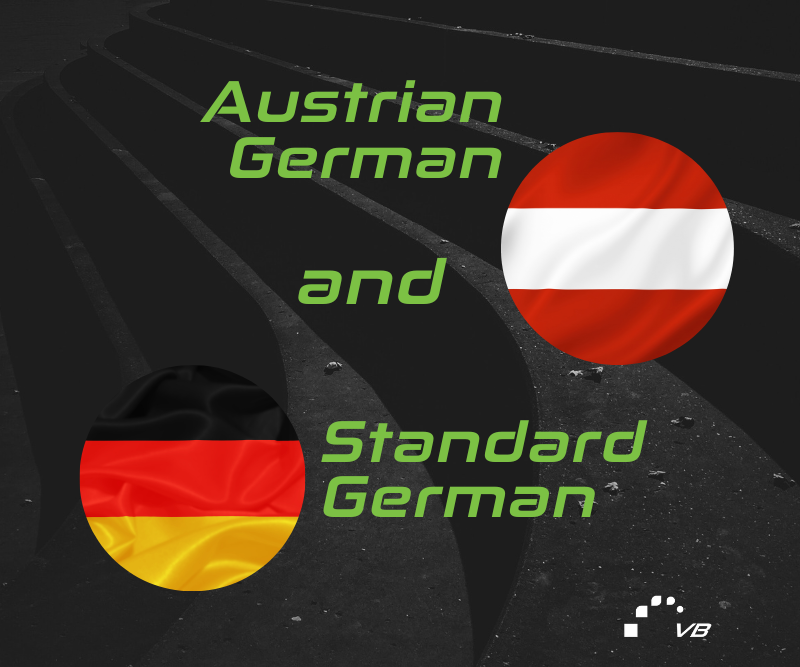
The official language in Austria is German. It is also referred to as Austrian German, Austrian High German, and Austrian Standard German. In short, they call it Austrian. Today we are going to talk about the differences between Austrian German and Standard German.
9.5 million people speak Austrian German in Austria, Italy (South Tyrol), Peru (Pozuzo), Hungary (Ödenburg, Pilisvörösvár), and Slovakia (Blaufuss, Kuneschau). Austrian is not a dialect but a variant of German.
In everyday life, however, many Austrians speak the dialect. There are about 15 dialects, the basic structure of which are Alemannic, Bavarian, or East Franconian.
For example, the Viennese dialect is also a part of the Bavarian dialect. Viennese is spoken in Vienna and the surrounding area. And the Viennese dialect has a special prestige among the Austrians. It actually has the validity of a common Austrian colloquial language that is very closely related to the literary language. This can be explained by the fact that a quarter of the Austrian population lives in Vienna and has close ties to all parts of Austria.
In the Viennese dialect, for example, people like adding “an ending” -erl to nouns. For example, Tascherl (bags) or Häuserl (little houses). This can serve as a diminutive, but it can also be an expression of particular sympathy.
In Tyrol, most locals speak the South Tyrolean dialect, which differs audibly from the standard German language. For example, you can’t even recognize the word “banana” right away because, for Tyroleans, it means “Banane-kch”.
History
The language in Austria has a long history related to the political and cultural development of the Austrian state. The path of the Austrian language to independence was not easy. There was a great influence of German on Austrian German.
Traces of other languages in Austrian German
However, other people also left their traces in Austria’s standard language thanks to Austria’s geographical location and partly shared history (like Hungary in the Danube monarchy).
For example, the Latin “Aviso” (Hinweis (eng. note), “Matura” (Abitur (eng. school certificate), “Primar” (leitender Arzt (eng.senior doctor), “Remuneration” (Entschädigung (eng. compensation).
There word which come from French. For example, “eminent” (sehr (eng. very), “manipulant” (Hilfskraft (eng. assistant), “falott” (Betrüger (eng. con-man), “tentieren” (beabsichtigen, (eng. intend).
The Italian words can also be found in the standard language of Austria, especially in food and fruit names such as “Biskotten” (Löffelbiskuit (eng. spoon biscuit), “Maronu” (Edelkastanie (eng. sweet chestnut), “Zibebe” (Rosinen, (eng. raisins).
The Austrian vocabulary was enriched by the following words from the Hungarian language: “Fogosch” (Zander (eng. pike-perch), “Gate” (Hose (eng. trousers), “Schinakel” (Ruderboot, (eng. rowing boat).
Grammar and Phonetics
Austrian German differs from Standard German. It differs in pronunciation, vocabulary, and grammar.
When it comes to names, the surname usually goes first, followed by the first name and the definite article. So Mitzi Huber becomes “the Huber Mitzi (die Huber Mitzi)” and Franz Gruber “the Gruber Franz (der Gruber Franz).”
The letters J and Q are not pronounced Jot and Ku in Austria, but Je and Kwee.
The difference in grammar, for example, is the use of the auxiliary verb sein in the perfect tense of certain verbs. For example, in Austrian German, Ich bin gestanden (I have woken up). And in Standard German, Ich habe gestanden (I have woken up). This is a big surprise for those who have studied classical German grammar well, isn’t it?
Personal pronouns are written and pronounced differently in Austrian German than in Hgh German of Germany.
ich (I) – i
er (he) / sie (she) / es (it) – ea / sie / es
wir (we) – wia / mia
ihr (you – plural – informal) – ia / eß
sie (they) – se
Since the Austrians use the O instead of the A, the conjugation of the verb “haben” in Austria rings quite unusual for those learning Standard German .
ich habe (I have) – i hob
du hast (you have) – du host
er (he) / sie (she)/ es (it) hat (has) – ea / sie / es hod
wir haben (we have) – wia / mia hom
ihr habt (you (plural informal) have) – ia / eß hobt
sie (Plural) haben (they have) – se hom – se
Then it is not easy for German learners to understand the sentence in Austrian German, “Des hobts ia good gmocht” as “Das habt ihr gut gemacht” (you have done it well)
Vocabulary
Austrianisms
It is interesting to know that there are words that are only used in Austria and are either perceived as typically Austrian in the rest of the German-speaking area or are not common or incomprehensible. These are called Austrianisms.
An interesting example of this is the word “Schmarr(e)n, der” which means pastry, nonsense, or inferior product. The most famous pastry is probably the Kaiserschmarren, a pastry made from roughly chopped pancake pieces, served with apple sauce or roasted plums. But “Schmarr(e)n” can also be used as the word “nonsense” when we talk about terms for products and also for statements or artistic works.
For example, “I won’t watch such nonsense.”
Greetings
Grüß Gott / Servus / Griaß di are greetings in Austria.
“Hallo” and “Guten Tag” are being used more and more frequently in Austria, but in order to make a good impression on the older generation, one should use Grüß Gott as Catholic greeting. A charming “Servus” (or also “Servas” / “Seas”) should be used when we talk to younger people and when hiking or out of town, “Griaß di” (plural: “Griaß enk” / “Griaß eich” = Hello) is the best choice.
For example, „Servus, grüß dich, wie geht’s dir?“ (Hi, I greet you (singular, informal), how are you (singular, informal)?)
Nuances
But there are nuances that you must know to order a coffee in Austria. If you’d like to order milk coffee, espresso, cappuccino, or iced coffee in Germany, they say differently in Austria.
Anyone who only orders a “coffee” in Austria usually faces a lack of understanding. Melange, Verlängerter, kleiner Schwarzer? In Austria, a simple black coffee is called Verlängerter. If you want a sip of milk with your espresso, order a kleinen Braunen. And the famous melange corresponds to the cappuccino.
For example, “I’ll have a Verlängerter and an apple strudel, please.”
“Verschauen” in Austrian means fall in love. Whereas in German, they use the verb “verlieben.”
“Ballestern” in Austrian means “play football.” Whereas in German, they say “spielen Fußball.”
“Hausaufgaben” in Austrian means “to do homework.” Whereas in German, they say “Hausübungen.”
Should I learn Austrian or Federal German?
For studying:
If you want to study in Austria, then it is important not only for you to speak Standard German but also to speak Austrian so that you don’t feel like a stranger to local students and can enjoy the special features of Austrian culture and history.
For Work:
If you want to work in Austria, you should also be able to understand and speak Austrian in order to communicate with colleagues in a friendlier way and to gain more of their trust.
Moving a country:
If you are going to move to another country, you should learn the official language of the country.
For personal reasons:
If you are fascinated by Austria. Then the choice is obvious. :-)
Whichever variant you choose, you can still contribute to the world in more ways than one!
SPEAK BUILD CONTRIBUTE
Used sources:
Bebbel.com. bebbel.com - This website is for sale! - languages Resources and Information. (n.d.). Retrieved January 8, 2023, from http://de.bebbel.com/
Geheimtipps, kulinarik und inspiration für österreich. 1000things. (2023, January 9). Retrieved January 10, 2023, from https://www.1000things.at/
Informační Systém. Informační systém Masarykovy univerzity. (n.d.). Retrieved January 8, 2023, from https://is.muni.cz/
OeAD, agency for education and internationalisation. Studieren in Österreich. (2023, January 10). Retrieved January 10, 2023, from https://studyinaustria.at/de/
Text revision, production, translation – Lektorat Unker. Text Revision, Production, Translation – Lektorat Unker. (n.d.). Retrieved January 8, 2023, from https://www.unker.com/en/
Wikimedia Foundation. (2022, August 13). M. Wikipedia. Retrieved January 8, 2023, from https://de.wikipedia.org/wiki/M
YouTube. (n.d.). Doppelt Hält Besser – learn German. YouTube. Retrieved January 10, 2023, from https://www.youtube.com/@dhb.deutschinoesterreich
Easter traditions in the USA, Germany, and Mexico
People celebrate Easter in many countries and have different traditions
6 Tips to defend your point of view in English
Standing up and defending your point of view might be
International Women’s Day
International Women's Day is celebrated every year on March 8th.






